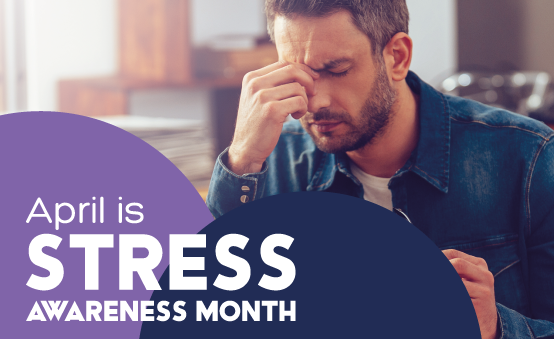Stress. It’s unavoidable. From the pressure of a big project at work, to an argument with a loved one. Although not usually in our control, it’s important to tackle your stress before it becomes overwhelming. And what better time to do this than Stress Awareness Month.

Don’t let stress grind you (and your teeth) down – Stress Awareness Month
Studies have shown that 74% of UK adults have felt so stressed at some point over the last year, that they felt overwhelmed or unable to cope. However, it’s often not taken as seriously as physical health. Stress can have a detrimental impact on our mental health, and this can lead to anxiety and depression. But did you know that it’s also the most common cause of teeth grinding?
Teeth grinding and stress
Many studies have shown a link between stress and bruxism (grinding and clenching teeth). There are various reasons as to why this could be.
When we’re stressed, cortisol (a hormone that helps the body respond to stress) is released, and our sympathetic nervous system becomes active. This triggers a physical response from our body. Muscles in your jaw may subconsciously hold tension and lead to clenching. This physical tension could then develop into teeth grinding.
Another reason is poor sleep. When you’re tossing and turning at night, it can stop us from entering a deep sleep. Bruxism normally occurs during light sleep, increasing the chances of your night-time grinding.
Ready to relieve some tension?
The 5-4-3-2-1 method
When you’re consumed by stress, you can lose sense of the present moment. Your mind starts to dart in every direction, and you begin living in your head. The 5-4-3-2-1 technique helps you to connect with your surroundings and be present in the moment.
Start by taking a few deep breaths to calm your mind and body.
5
Take time to really look around your physical surroundings. Name five things that you can see. It could be a cup, or even a mark on the wall.
4
What are four things around you that you can touch? Feel the different textures. A fluffy pillow or smooth surface perhaps.
3
Close your eyes and just listen. Name three things you can hear. Distant traffic. Birds outside your window.
2
Notice two things that you can smell. If you’re struggling, move around and find objects nearby.
1
Finally, name one thing that you can taste. Maybe a mint that’s lingering in your mouth.
Repeat the process whenever you feel stressed or anxious. The technique should bring you back into reality, and help you feel ready to move forward with your day.
Further relief for your teeth
As well as trying stress-relief techniques, wearing a mouth guard can also help to treat bruxism. Bruxeeze offers a range of both self-fit and custom fit night guards for every level of grinding – from mild daytime bruxing to heavy grinding at night. They work by preventing your upper and lower teeth from grinding against each other. You can find out more about each of our night guards here.
By taking your first steps in reducing stress, you’ll benefit both your mental and physical health long-term.
Stress Awareness Month runs throughout April 2022 with the theme ‘community’. To find out more, visit https://www.stress.org.uk/national-stress-awareness-month/.
